Back On The Road: Ukrainian Refugees Have To Vacate Bulgarian Seaside Hotels

Anastasia Zaitseva waits with her two young children outside the Black Sea resort hotel she has called home since March to board a bus for another journey to an unknown destination after fleeing war in Ukraine.
She is one of tens of thousands of refugees Bulgarian authorities had hoped to relocate by the end of May due to cuts in subsidies and the start of the summer holiday season, when businesses along the Black Sea coast make most of their money.
With her own cash running short, 35-year-old Zaitseva and many like her are relying on Bulgarian authorities to relocate them even if they have no idea where they might end up.
"We were checking our emails all day and waiting for some information," said Zaitseva, from Kremenchuk, central Ukraine, standing outside the Melia Sunny Beach hotel in the heart of Bulgaria's largest Black Sea resort.
"I have some money but its not enough to fully provide for the children. I am concerned about where we will be sent. I need a kindergarten, a school, conditions for the children and some hospital," said Zaitseva, whose husband stayed behind in Ukraine to fight.
Nearly 7 million people have fled Ukraine since Russia invaded on Feb. 24, creating Europe's worst refugee crisis since the end of World War Two. Fighting continues unabated and there is no sign of a ceasefire.
'UNPRECEDENTED SUPPORT'
More than 100,000 Ukrainian refugees, mostly women and children, have fled to Bulgaria since the start of the war.
The government placed around 60,000 refugees at beach-front resorts during the low season at places such as the Melia Sunny Beach hotel. Its manager, Hristo Karailiev, said it had housed around 2,500 Ukrainians at one point.
Following the government push to empty the hotels, Karailiev said most refugees had left apart from some 175 who will remain as seasonal workers at the resort, which has sea views and swimming pools scattered around the grounds.
"They are stressed by the unknown because they were not told until the last minute where they will be accommodated," said Karailiev, whose 3,200 capacity four-star hotel is popular with tourists from Britain, Germany and Poland.
Bulgaria does not share a border with Ukraine but many refugees fled there via its northern neighbour Romania, which does border Ukraine, keen to remain relatively close to home in hopes of an early return.
But with the summer tourist season approaching and the government cutting its 40 lev ($22) daily subsidy paid for each refugee to hotel owners, the Ukrainians face a stark choice: return home, find their own accommodation or relocate to wherever the state can offer space.
"For the past three months we provided unprecedented support at very nice hotels," Prime Minister Kiril Petkov said in May. "Bulgaria cannot provide such a luxurious stay endlessly."
Initial plans to transport most of the refugees directly from Black Sea hotels to state-owned vacation lodgings -- often far from cities -- failed due to lack of interest, officials said. Volunteer groups blamed a lack of information and poor communication of the plan.
While official data showed that in the last week around 16,000 refugees returned to Ukraine, the government has changed tack and opened two temporary refugee camps near the Black Sea city of Burgas and in Elhovo near the Turkish border.
Its approach has drawn criticism from the opposition and volunteer groups while illustrating challenges the European Union's poorest member state faces as it shifts to providing long-term assistance to refugees.
As of June 2, the government had placed some 3,000 refugees at state-owned facilities, with another 12,000 relocating to smaller hotels which signed up for reduced state subsidies.
Many refugees such as 25-year-old Nadezhda Kuzmenko -- waiting with her parents to board a bus to take them to new accommodation -- expressed gratitude to Bulgaria for accepting them but also complained about the lack of information.
"They are keeping silent about the place we are going next," said Kuzmenko, who arrived in the Black Sea city of Varna on March 17 after fleeing her town of Mykolaiv in southern Ukraine.
"In five minutes we are going and we still do not know the place. I do not know why they are keeping it as a secret."
($1 = 1.8297 leva)
(Editing by Michael Kahn and Gareth Jones)
© Copyright Thomson Reuters 2024. All rights reserved.





















